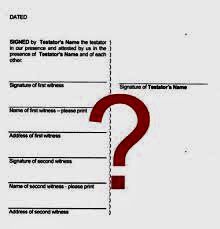
In Gust v Langan 2020 SKQB 42, a Saskatchewan decision, the court held that a hand written undated napkin written by the deceased when he believed he was having a heart attack, was found to be a valid will.
The case is somewhat distinguishable from the law in British Columbia, in that the court held that the napkin was a valid holograph will. A holograph will must be wholly in the handwriting of the testator and signed by him or her, and may be made without any further formality or any requirement as to the presence of a witness attestation.
Saskatchewan does however have similar legislation to sections 57 and 58 of WESA, and the writer presumes that this case would be followed in British Columbia under section 58 WESA.
The court found that there was sufficient evidence to establish circumstances that augured for finding that the testator had requisite testamentary intention to create a will, and the court was satisfied that the document showed the testator’s final wishes. There was evidence of three siblings that satisfied the court that the document was a valid will that should be admitted into probate.
Of note is that the court considered the decision George v Daily (1997) 15 ETR (2d) 1, a Manitoba court of appeal case that has been followed in British Columbia for rectification of wills under section 58 WESA that do not conform with proper execution.
George v Daily held with respect to whether the document represents the deceased final wishes, stating:
“The term testamentary intention means much more than a person’s expression of how he or she would like his or her property to be disposed of after death. The essential quality of the term is that there must be a deliberate or fixed and final expression of intention as to the disposal of his or her property on death. Re Gray: Milinary v Winfrey ( 1961) SCR 91.”
Simply put, the court had to determine that the deceased created a will, and that he wished to distribute his property upon his death, and that this wish was a fixed and final expression of his intention.




